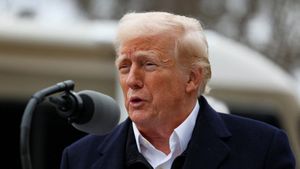Asian stock markets took a notable hit on Monday, February 3, as fears grew over the potential economic consequences of tariffs imposed by U.S. President Donald Trump on key trading partners. The decision to enact tariffs on China, Canada, and Mexico sent significant ripples across major Asian indices, resulting in widespread declines.
Japan's premier stock index, the Nikkei 225, suffered immensely, closing down 1,052.40 points or 2.66%, ending the day at 38,520.09. Its broader counterpart, the TOPIX index, also plummeted, losing 68.27 points or 2.45% to finish at 2,720.39. Analysts pointed to the heavy impact on sectors with strong ties to international trade, particularly automotive producers.
According to Masahiro Ichikawa, chief market strategist at Sumitomo Mitsui DS Asset Management, "The tariffs raised prospects of Japanese auto products from Mexico being more expensive in the United States, and sales taking a hit." This sentiment was echoed throughout the trading day, highlighting concerns over the upcoming tariffs, which are set to take effect shortly. With automakers heavily reliant on supplies and production networks extending across North America, the risk of increased costs looms large.
The market reaction wasn’t confined to Japan. India's prominent Sensex and Nifty indices also showcased declines, reflecting the overall sentiment permeated by the uncertainty related to U.S. trade policies. With Trump’s threats extending beyond North America, potentially targeting the United Kingdom and the European Union, the climate of uncertainty overshadowed investor confidence across the region.
Other major Asian indices mirrored these trends. South Korea's Kospi dropped 2.54% or 64.04 points, eventually settling at 2,453.33. The Hang Seng index from Hong Kong was not spared either, slipping by 0.45% or 91.99 points to reach 20,133.12. Meanwhile, the Shanghai Composite, though resisting some of the larger declines, still reflected downward momentum.
Ichikawa elaborated, stating, "At the moment investors were taking the view...that the tariffs are leading to a worse scenario in which a trade war could spread." This perspective is fueling fear and caution among traders, with many opting for defensive strategies as they reassess their portfolios.
The potential response from neighboring countries, including Canada and Mexico, has created added volatility. Reports indicated Canada’s plans for retaliatory measures, which, alongside Mexico’s commitments to respond, have left the global economic outlook uncertain. Investors are closely watching for developments as they gauge the potential fallout from these trade tensions.
The declines observed on Monday were also exacerbated by the performance of U.S. futures, which showed signs of weakness. This influenced sentiment on Asian stock exchanges, as expectations of worsening conditions from potential tariffs weighed heavily on the minds of investors.
Even within the tumultuous trading environment, some stocks experienced gains. For example, Sumitomo Dainippon Pharma Co. saw significant increases, rising by 16.39%. Conversely, NH Foods Ltd faced severe losses, plummeting 10.96% amid the general chaotic atmosphere of stock trading.
Trading dynamics revealed overwhelming declines outpacing gains, with falling stocks significantly outnumbering those advancing by 2863 to 830 on the Tokyo Stock Exchange alone.
Given these stark movements and affected sectors, the comprehensive picture of Asian markets suggests traders brace for continued turbulence as they navigate the uncertain economic waters brought about by U.S. tariff risks. With multiple stakeholders affected and no clear resolution on the horizon, the market’s overall direction will depend heavily on forthcoming geopolitical developments and economic data.
Market analysts will be focusing not only on tariff adjustments but also on central bank responses and shifts impacting interest rates globally. The prospect of elevated interest rates, particularly from the Federal Reserve, adds another layer of complexity, making it imperative for investors to stay informed and agile.
Overall, the situation surrounding tariffs continues to incite significant fluctuations within Asian markets, and as investors brace for what lies ahead, it becomes increasingly important to remain vigilant to shifts and pressures stemming from the United States.



